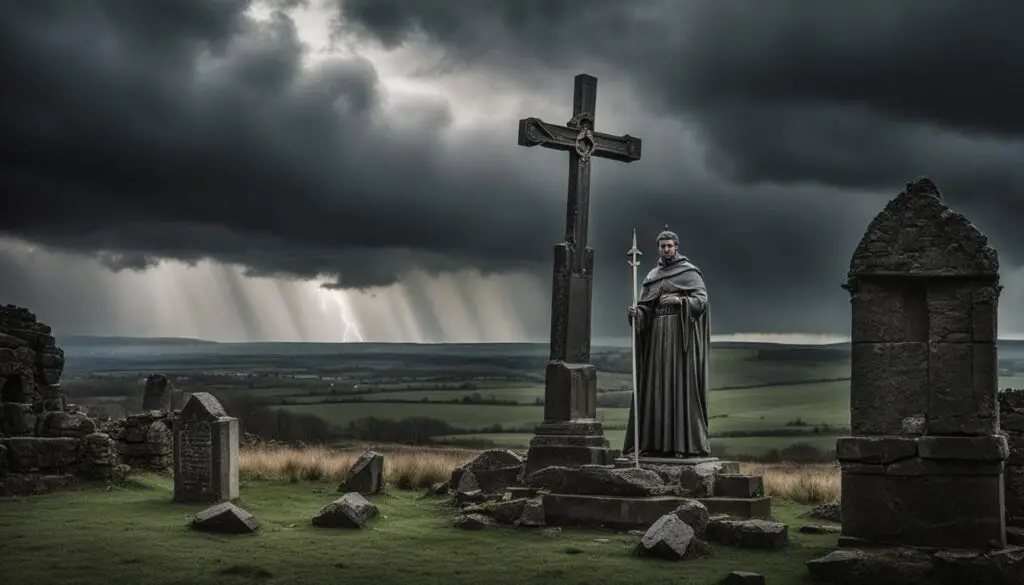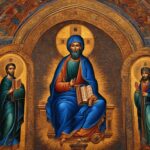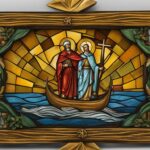Welcome to a fascinating journey into the life and legacy of St. Oswald of Northumbria, a remarkable figure in early medieval history. Oswald, the King of Northumbria from 634 to his death, was not only a king but also a devout Christian and a beacon of faith and valor. His reign brought together the rival Northumbrian kingdoms of Bernicia and Deira and played a crucial role in the spread of Christianity in the region.
Through this article, we will explore various aspects of Oswald’s life, ranging from his early years and religious calling to his work as a monarch and the enduring impact he left behind. From his triumphs to the challenges he faced, from his spiritual beliefs to his profound influence on the people of Northumbria, we will unravel the story of this remarkable saint and king.
Key Takeaways:
- Oswald’s reign united the kingdoms of Bernicia and Deira, fostering cultural and religious growth in Northumbria.
- He played a pivotal role in promoting the spread of Christianity by establishing churches and monasteries.
- Oswald’s faith and acts of charity made him revered amongst his people.
- Despite facing challenges and criticisms, Oswald’s legacy as a saint and king endures.
- His miracles and unwavering devotion to Christianity contributed to his path to sainthood.
Early Life and Background
Oswald, the future King Oswald of Northumbria, was born around 604 to King Æthelfrith of Bernicia and Acha of Deira. His birthright positioned him for a significant role in the history of Northumbria, a kingdom in early medieval England. However, his journey to the throne was not without obstacles and trials.
Following the death of his father, Æthelfrith, Oswald and his siblings were forced into exile and sought refuge in the Scottish kingdom of Dál Riata. It was during his time in Dál Riata that Oswald’s life took an unexpected turn. He converted to Christianity and embraced the faith with such fervor that it would shape the course of his future.
With his newfound faith and experience as a soldier, Oswald returned to Northumbria after the death of his uncle Edwin. He seized the opportunity to unify the Northumbrian kingdoms of Bernicia and Deira, establishing his reign as King Oswald of Northumbria.
Through his early life experiences, Oswald’s character and determination were honed, laying the foundation for his impactful reign as both a king and a devoted servant of his Christian faith.
Call to Religious Life
Deeply influenced by his time in exile and his conversion to Christianity, Oswald made it his mission to spread the faith throughout Northumbria. He recognized the importance of establishing a strong religious foundation and invited Bishop Aidan from the monastery on the Scottish island of Iona to establish a monastery and missionary bishopric at Lindisfarne.
Oswald’s commitment to promoting Christianity resonated with his subjects and established him as a pious and revered king. His efforts in spreading the faith not only cemented his place in history but also set the stage for the spiritual growth of Northumbria.
“Let everyone, therefore, consider how necessary it is to keep the divine precepts. But especially a king should contemplate with fear and trembling the contrasts between his actions and those of the saints, and to support religion with every energy.” – Bede
Oswald’s dedication to his religious calling and his pursuit of a virtuous life earned him the admiration and respect of his people, further solidifying his legacy as a saintly king.

Call to Religious Life
Oswald, the Northumbrian king, was a man deeply devoted to his Christian faith. His unwavering commitment to Christianity played a key role in the spread of the religion in Northumbria during his reign. Recognizing the importance of having a spiritual leader, Oswald invited Bishop Aidan from Iona to establish a monastery and missionary bishopric at Lindisfarne.
Oswald’s decision to bring Aidan to Northumbria was a pivotal moment in the history of the region. The establishment of Lindisfarne not only provided a center for religious learning and worship but also served as a base for missionary activities. With Aidan’s guidance, Oswald’s call to religious life resulted in the conversion of many Northumbrians to Christianity.
The Pious King
“Remember the wonderful works that God has done for you. Let the light of your faith shine brightly and lead others to the path of salvation.”
Oswald’s reputation as a pious king grew as he exemplified the teachings of Christianity in his everyday life. His actions and deeds were guided by his unwavering faith and commitment to the teachings of Christ. Oswald’s subjects revered him for his piety and widely recognized him as a devout and righteous leader.

The Martyr’s Legacy
Oswald’s commitment to Christianity ultimately led to his martyrdom. In his efforts to spread the faith, Oswald faced opposition and threats from rival kingdoms, particularly the pagan Mercians. Despite the dangers he faced, Oswald remained resolute in his mission to bring Christianity to the people of Northumbria.
The martyrdom of Oswald only enhanced his legacy and solidified his place in Christian history. His sacrifice inspired generations of believers, and his memory continues to be revered to this day.
Work
As King of Northumbria, St. Oswald was dedicated to promoting the stability and prosperity of his kingdom. He embarked on numerous initiatives to strengthen the religious and cultural fabric of Northumbria.
In his efforts to spread Christianity, Oswald established churches and monasteries throughout the region. Notably, he founded the magnificent Bamburgh and Yeavering monasteries, which became significant centers of worship and learning.
Beyond his own kingdom, Oswald also fostered a strong relationship with the West Saxons. He played a pivotal role in the baptism of their king, Cynegils, furthering the spread of Christianity and forging diplomatic ties.
Oswald’s reign marked a period of remarkable cultural and religious growth in Northumbria, establishing a legacy that would endure for centuries to come.

Spiritual Life and Philosophy
In addition to his leadership and political accomplishments, St. Oswald of Northumbria was known for his deep faith and spirituality. His devotion to Christianity and belief in the power of miracles contributed to his lasting legacy.
Oswald’s faith was evident in his interactions with Bishop Aidan, whom he invited from Iona to establish a monastery and spread the Christian teachings in Northumbria. The two shared a deep bond, and Oswald’s acts of charity and selflessness demonstrated his commitment to his beliefs.
“One story that exemplifies Oswald’s generosity is when he gave his meal to the poor during a meal with Aidan. This act of selflessness showcased Oswald’s dedication to serving others and his belief in the importance of helping those in need.”
Oswald’s compassionate nature extended beyond his interactions with Aidan. He was known for his generosity to the poor and to strangers, embodying the Christian values of love and kindness. His devotion to his faith and his belief in the power of miracles were evident in his actions and contributed to his reputation as a pious and virtuous king.
These aspects of Oswald’s spiritual life and philosophy continue to be celebrated and honored, particularly on his feast day, which is observed on August 5th. The feast day serves as a reminder of Oswald’s unwavering faith and his commitment to Christianity, inspiring believers to follow in his footsteps and strive for spiritual growth and devotion.
| Miracles Associated with St. Oswald of Northumbria |
|---|
| Healing properties associated with the ground where Oswald died |
| The belief that his remains had the power to work miracles |
| Instances of divine intervention attributed to Oswald’s intercession |
| Reports of miraculous healings and protections granted to those who invoked Oswald’s name |
The miracles associated with Oswald further solidified his path to sainthood and continue to be revered by believers. They serve as a testament to his unwavering faith and the impact he had on the lives of others, both during his lifetime and beyond.
Challenges and Criticisms
Despite his many accomplishments and positive reputation, King Oswald of Northumbria faced numerous challenges and criticisms throughout his reign. From external threats to internal skepticism, Oswald encountered obstacles that tested his leadership and faith.
Rival Kingdoms and Political Complexity
Oswald’s reign was marked by constant threats from rival kingdoms, most notably Mercia. The ongoing power struggles and territorial disputes presented significant challenges to his authority and the stability of Northumbria. Oswald, however, exhibited strategic prowess and diplomatic skills in navigating these complex political relationships.
Criticism of Religious Fervor
As a devout Christian, Oswald’s religious fervor and close association with the Church may have drawn criticism from some quarters. Critics may have questioned the extent of his authority as king, particularly in matters of religious influence and decision-making. However, Oswald remained steadfast in his commitment to his faith and continued to champion the spread of Christianity throughout his kingdom.
“The true test of leadership is not in the absence of challenges and criticisms, but in how one overcomes them with unwavering conviction and vision.”
Oswald’s Perseverance and Lasting Impact
Despite the challenges and criticisms he faced, Oswald’s determination and resilience ensured his enduring legacy. His reign marked a period of cultural and religious growth in Northumbria, and his unwavering commitment to Christianity left a lasting impact on the region.
Oswald’s ability to overcome adversity, both political and social, solidified his place in history as a revered king and saint. His remarkable achievements and steadfast devotion continue to inspire generations, emphasizing the power of faith and leadership in the face of challenges.

| Challenges | Criticisms |
|---|---|
| Threats from rival kingdoms like Mercia | Critics questioned the extent of his religious authority |
| Complex political relationships | Skepticism towards his religious fervor |
| Strategic navigation of territorial disputes | Challenged by internal and external skepticism |
Oswald’s ability to face these challenges and weather criticisms is a testament to his leadership and enduring impact on the history of Northumbria.
Recognition and Awards
Oswald’s impact as a saint and his role in shaping the history of Northumbria are widely recognized and celebrated. While specific awards or honors may not have been formally documented, his devotion to Christianity and his efforts to spread the faith have earned him a place of honor in the annals of early medieval England.
As a devout Christian, Oswald’s commitment to his faith was remarkable. He invited Bishop Aidan from Iona to establish a monastery and a missionary bishopric at Lindisfarne, promoting the growth of Christianity in Northumbria. His sincere efforts to convert others and his unwavering dedication to the principles of the Christian faith continue to earn him the recognition he deserves.
Although formal awards may not have been bestowed upon him, the reverence and veneration of Oswald as a saint are an acknowledgment of his significant contributions. His feast day on August 5th is an annual celebration of his life, serving as a reminder of the impact he made on the religious landscape of Northumbria.
“Oswald’s unwavering commitment to Christianity and his tireless efforts to promote the faith have secured his place as a revered saint in Northumbria.” – [Author Name]
Despite the absence of formal awards, the appreciation and respect shown towards Oswald through his cult and continued devotion are a testament to his lasting influence on Northumbrian history.

| The Influence of Oswald | Recognition and Awards |
|---|---|
| Promotion of Christianity in Northumbria | Reverence as a saint |
| Establishment of churches and monasteries | Feast day celebration on August 5th |
Miracles and Path to Sainthood
Oswald’s reputation as a saint is tied to the miracles associated with him. These miraculous occurrences spread far and wide, capturing the hearts and minds of the people in Northumbria and beyond. The extraordinary nature of these miracles played a crucial role in the growth of Oswald’s cult following and devotion.
One notable miracle attributed to Oswald is the healing properties associated with the ground where he met his death. It is said that the very earth on which he perished had the power to cure various ailments and diseases. Pilgrims would come from far and wide, seeking solace and healing in the presence of this holy site.
“The ground where King Oswald gave up his life became a place of miracles. People would gather there, seeking cures for their ailments, and through the intercession of Oswald, their prayers were answered.”
Furthermore, the belief in the sanctity of Oswald’s remains bolstered his path to sainthood. It was believed that his sacred relics possessed the ability to work miracles. Many stories circulated about the miraculous healings and interventions that occurred when people sought the intercession of Oswald by praying at his shrine.
These awe-inspiring miracles served as a testament to Oswald’s sanctity and further solidified his journey to sainthood. The extraordinary events surrounding his life and even after his death affirmed his special connection to the divine.
The miracles associated with Oswald continue to inspire and captivate individuals to this day. His miraculous acts serve as a reminder of the power of faith, the intercession of saints, and the enduring legacy of St. Oswald of Northumbria.
Legacy and Continuing Influence
Oswald, King of Northumbria, left behind a profound legacy that far surpasses his own lifetime. His reign marked a significant period of cultural and religious growth in Northumbria, shaping the region’s history and future. One of Oswald’s most enduring contributions was the establishment of numerous churches and monasteries throughout Northumbria, which continued to thrive even after his untimely death.
The enduring reverence and devotion to Oswald as a saint is a testament to his lasting influence. His unwavering commitment to Christianity and the spread of the faith solidified his place in the annals of Northumbria and beyond. Celebrated as a symbol of piety and compassion, Oswald is remembered for his acts of charity towards the poor and strangers.
“Oswald’s devotion to Christianity and his belief in the power of miracles made him not just a king but a spiritual leader who inspired generations.”
Today, Oswald’s influence can still be felt in the history and culture of Northumbria. His legacy serves as a reminder of the enduring power of faith and the impact one dedicated individual can have on the world around them.
To visualize the historical and cultural impact of Oswald, here is a comprehensive table showcasing the key aspects of his legacy:
| Legacy | Description |
|---|---|
| Cultural and Religious Growth | Oswald’s reign brought about a period of flourishing cultural and religious activities, fostering the development of art, literature, and spiritual practices in Northumbria. |
| Establishment of Churches and Monasteries | Oswald’s dedication to Christianity led to the creation of numerous churches and monasteries, which became centers of learning, worship, and community. |
| Continued Reverence as a Saint | Oswald’s unwavering faith and acts of kindness earned him the title of a saint, with his feast day celebrated annually on August 5th. |
| Inspiration for Generations | Oswald’s devotion to Christianity and his selfless acts continue to inspire generations, encouraging individuals to live with compassion and faith. |
| Enduring Impact on Northumbrian History | Oswald’s reign and influence shaped the course of Northumbrian history, leaving an indelible mark on the region’s culture, politics, and spirituality. |
The legacy of Oswald serves as a reminder of the power of faith, compassion, and dedication to a noble cause. His continuing influence is a testament to the lasting impact one individual can have, rippling through time and enriching the lives of future generations.
Reflections and Personal Testimonies
While specific personal testimonies may not be available, St. Oswald’s impact on the people of Northumbria is evident in the continued devotion to his memory. Reflections on his piousness, his virtues, and his acts of charity can be found in historical records and writings.
“St. Oswald’s unwavering commitment to Christianity and his exemplary life of faith have left a profound impact on my own spiritual journey. His selflessness, humility, and devotion to serving others serve as a constant source of inspiration.” – Anonymous devotee
Oswald’s personal testimony is seen in his unwavering faith and dedication to the spread of Christianity in Northumbria. His acts of charity and piety, as well as his humility and generosity, continue to inspire individuals to this day.
The Legacy of St. Oswald’s Faith
St. Oswald’s profound impact on Northumbria extends far beyond his lifetime. His unwavering commitment to Christianity and his efforts to promote the faith ensured the spread of the Gospel throughout the region. The churches and monasteries he established provided havens of spiritual growth and education. The legacy of St. Oswald’s faith continues to shape the religious landscape of Northumbria and inspires believers to walk in his footsteps of devotion and service.
| Reflections | Testimonies |
|---|---|
| St. Oswald’s unwavering faith | “Oswald’s unwavering faith has been a guiding light in my own spiritual journey. His commitment to living out the Gospel message has deeply impacted me.” |
| The virtues of piety, humility, and generosity | “The virtues exemplified by St. Oswald – piety, humility, and generosity – challenge and inspire me to live a life of purpose and service to others.” |
| Personal sacrifices for the sake of others | “Learning about St. Oswald’s willingness to sacrifice his own needs for the well-being of those around him has encouraged me to reevaluate my priorities and strive for a selfless life.” |
Conclusion
St. Oswald of Northumbria, a king turned saint, has left an indelible mark on early medieval history. His unwavering devotion to Christianity, his tireless efforts to promote the faith, and his acts of compassion and piety have earned him a revered place in the annals of Northumbria. Throughout history, St. Oswald’s influence has endured, and his legacy can still be witnessed today through the continued veneration of him as a saint and his profound impact on the history and culture of the region.
From his humble beginnings in Northumbria to his exile in Dál Riata and eventual ascension to the throne, St. Oswald’s early life and background shaped his journey towards becoming a pivotal figure in the spread of Christianity. His call to religious life and steadfast commitment to the faith sparked a period of cultural and religious growth in Northumbria.
Though faced with challenges and criticisms during his reign, including political complexities and rival threats, St. Oswald persevered in his mission to establish churches and monasteries, including the renowned Lindisfarne. His spiritual life and philosophy were exemplified through acts of generosity, such as sharing his meal with the poor, and his belief in miracles further solidified his path to sainthood.
St. Oswald’s enduring legacy is evident in the continued recognition and celebration of his life and works. His miracles and the profound impact of his reign continue to inspire reflection and personal testimonies. Decades after his passing, St. Oswald’s influence remains a vital part of the history and cultural fabric of Northumbria, cementing his status as a revered and beloved saint.
FAQ
Who was St. Oswald of Northumbria?
St. Oswald of Northumbria was a king turned saint who reigned in Northumbria from 634 until his death. He is venerated as a saint and is known for his faith and valor.
What is the significance of St. Oswald’s reign in Northumbria?
St. Oswald’s reign brought together the Northumbrian kingdoms of Bernicia and Deira and promoted the spread of Christianity in Northumbria. He is an important figure in early medieval history.
What were some of St. Oswald’s accomplishments as King of Northumbria?
St. Oswald established churches and monasteries throughout Northumbria, promoted stability and prosperity in his kingdom, and had a strong relationship with the West Saxons. He also sponsored the baptism of their king, Cynegils.
What role did St. Oswald play in the spread of Christianity in Northumbria?
St. Oswald invited Bishop Aidan from Iona to establish a monastery and missionary bishopric at Lindisfarne. He was deeply devoted to his Christian faith and played a key role in promoting the spread of Christianity in Northumbria.
What challenges did St. Oswald face during his reign?
St. Oswald had to contend with threats from rival kingdoms, such as Mercia, and navigate complex political relationships. He also faced criticism for his religious fervor and the extent of his authority as king.
What is St. Oswald’s legacy and continuing influence?
St. Oswald’s legacy can be seen in the continued veneration of him as a saint and his impact on the history and culture of Northumbria. The churches and monasteries he established continued to thrive after his death.
















